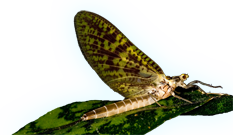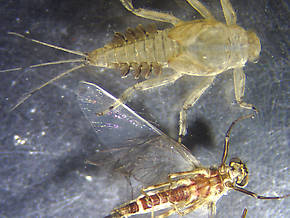Blog & Latest Updates
Fly Fishing Articles
Insects by Common Name

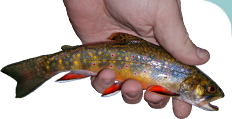
Dark Olive Spinners
Scientific Names
| Match | Scientific Name |
| Drunella lata | |
| Attenella attenuata | |
| Drunella flavilinea | |
| Dannella simplex |
Like most common names, "Dark Olive Spinner" can refer to more than one taxon. They're previewed below, along with 4 specimens. For more detail click through to the scientific names.
Mayfly Species Drunella lata
These are sometimes called Dark Olive Spinners.
When Selective Trout was first published in 1971, Swisher and Richards included Drunella lata (Small Blue-Winged Olive, Slate-Winged Olive) as a Midwestern "superhatch." Although it can also be found in many Eastern trout streams, it is probably more important to Midwestern anglers. Typically a morning emerger, this species often competes for the attention of trout with more abundant Tricorythodes and small baetids during parts of July and August. For this reason, the authors of Selective Trout considered the concentrated evening spinner falls to be more important than the somewhat sporadic morning emergence. From an angling standpoint, this situation is nearly the opposite of the earlier Drunella cornuta emergence in the East, where the morning emergence is usually the main event and spinner falls are often of little consequence.
Currently, Drunella lata shares its name with another mayfly, the former D. longicornis. That mayfly can be important in mountainous areas in the Southeast, but they are larger and the nymphs lack the distinctive pale markings mentioned in the Juvenile Characteristics section. (The information on this page does not describe D. longicornis)
Currently, Drunella lata shares its name with another mayfly, the former D. longicornis. That mayfly can be important in mountainous areas in the Southeast, but they are larger and the nymphs lack the distinctive pale markings mentioned in the Juvenile Characteristics section. (The information on this page does not describe D. longicornis)
Mayfly Species Attenella attenuata
These are very rarely called Dark Olive Spinners.
This intriguing species has received a lot of attention in past angling books. Recent authors suspect that much of this credit was a case of mistaken identity, with Attenella attenuata receiving praise for the hatches of Drunella lata and Dannella simplex. Much of the credit was legitimate and accurate, but this species is no longer thought to be on par with its most popular cousins in Ephemerella and Drunella.
I have several specimens listed under this species, but I'm not positive the identification is correct.
I have several specimens listed under this species, but I'm not positive the identification is correct.
Female Attenella attenuata (Small Eastern Blue-Winged Olive) Mayfly Dun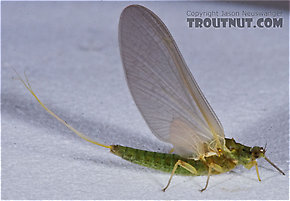 View 4 PicturesThis specimen came from the same hatch as a male.
View 4 PicturesThis specimen came from the same hatch as a male.
 View 4 PicturesThis specimen came from the same hatch as a male.
View 4 PicturesThis specimen came from the same hatch as a male.See 2 more specimens...
Mayfly Species Drunella flavilinea
These are very rarely called Dark Olive Spinners.
The Flavs pick up about a week after the closely related but larger Western Green Drakes (Drunella grandis and Drunella doddsii) finish hatching on most Western waters.
Their hatches may be complemented by simultaneous hatches of two less prolific species, Drunella coloradensis and Drunella spinifera.
Their hatches may be complemented by simultaneous hatches of two less prolific species, Drunella coloradensis and Drunella spinifera.
Drunella flavilinea (Flav) Mayfly Nymph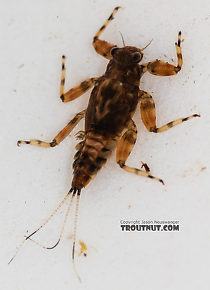 View 6 PicturesAlthough the identification is not certain because the nymph is not yet mature, the configuration of tubercles (
View 6 PicturesAlthough the identification is not certain because the nymph is not yet mature, the configuration of tubercles (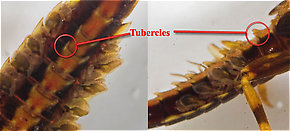 Tubercle: Various peculiar little bumps or projections on an insect. Their character is important for the identification of many kinds of insects, such as the nymphs of Ephemerellidae mayflies.) on this one--particularly the forefemora--seems to best match Drunella flavilinea.
Tubercle: Various peculiar little bumps or projections on an insect. Their character is important for the identification of many kinds of insects, such as the nymphs of Ephemerellidae mayflies.) on this one--particularly the forefemora--seems to best match Drunella flavilinea.
 View 6 PicturesAlthough the identification is not certain because the nymph is not yet mature, the configuration of tubercles (
View 6 PicturesAlthough the identification is not certain because the nymph is not yet mature, the configuration of tubercles (
A few (not all) of the abdominal tubercles on this Ephemerella needhami nymph are circled. They are especially large in this species.
Female Drunella flavilinea (Flav) Mayfly Dun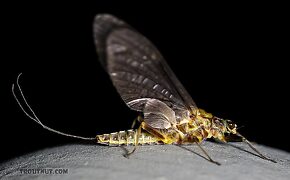 View 6 PicturesI can't be certain of the ID of this female dun, but I'm calling it Drunella flavilinea for three reasons: 1) the known abundance of "flavs" on the Henry's Fork, 2) clear differences in coloration from my confirmed specimens of Drunella coloradensis, which is the main lookalike, and 3) the habitat (a sizable river in a wide mountain valley, rather than a small, high-altitude stream) suggests it's not coloradensis.
View 6 PicturesI can't be certain of the ID of this female dun, but I'm calling it Drunella flavilinea for three reasons: 1) the known abundance of "flavs" on the Henry's Fork, 2) clear differences in coloration from my confirmed specimens of Drunella coloradensis, which is the main lookalike, and 3) the habitat (a sizable river in a wide mountain valley, rather than a small, high-altitude stream) suggests it's not coloradensis.
 View 6 PicturesI can't be certain of the ID of this female dun, but I'm calling it Drunella flavilinea for three reasons: 1) the known abundance of "flavs" on the Henry's Fork, 2) clear differences in coloration from my confirmed specimens of Drunella coloradensis, which is the main lookalike, and 3) the habitat (a sizable river in a wide mountain valley, rather than a small, high-altitude stream) suggests it's not coloradensis.
View 6 PicturesI can't be certain of the ID of this female dun, but I'm calling it Drunella flavilinea for three reasons: 1) the known abundance of "flavs" on the Henry's Fork, 2) clear differences in coloration from my confirmed specimens of Drunella coloradensis, which is the main lookalike, and 3) the habitat (a sizable river in a wide mountain valley, rather than a small, high-altitude stream) suggests it's not coloradensis.Mayfly Species Dannella simplex
These are very rarely called Dark Olive Spinners.
Although by no means a superhatch, this species can be important. Authors who discuss it lament the general lack of credit it receives for the fine hatches it produces on some streams.
Top 10 Fly Hatches
Top Gift Shop Designs
Eat mayflies.
Top Insect Specimens
Miscellaneous Sites
Troutnut.com is copyright © 2004-2024 Jason
Neuswanger (email Jason). See my FAQ for information about use of my images.
 privacy policy
privacy policy
